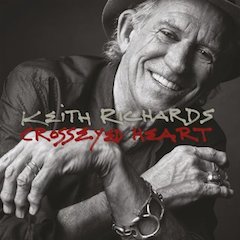
Keith Richards: …at his deepest roots, it’s pretty clear that it’s never been about him, but about what passes through him

CROSSEYED HEART
Keith Richards
Republic/Mindless Records (2015)
I don’t know about you, but listening to Keith Richards casually strumming his way through the Lead Belly classic “Goodnight Irene” on his third solo album, Crosseyed Heart, it’s hard not to break into a knowing grin when he hits the verse that says, “Sometimes I live in the country, sometimes I live in town/Sometimes I take a great notion, to jump in the river and drown.” We are, after all, talking about someone for whom there is actually a dedicated web page entitled “10 Times Keith Richards Almost Died,” which references things like: the Blitzkrieg bop bombing of the building he and his family were living in he was a toddler during World War II; the 1973 house fire at his country home in Redlands, England that was supposedly caused by a mouse chomping through an electrical wire (and not by the old “high and passed out with lit cigarette in bed” MO; that one was in France a few years before); 1998’s rib-breaking fall from a chair in the library of his suburban Connecticut home; and–last but very certainly not least–his skull-fracturing tumble out of a palm tree while vacationing in Fiji in 2006.
‘Amnesia,’ Keith Richards, from Crosseyed Heart
‘Robbed Blind,’ Keith Richards, from Crosseyed Heart
That last one, it would appear, was the inspiration for “Amnesia,” another track on Crosseyed Heart that’s sure to induce a smile or two, what with lines like “Knocked on the head, Everything went blank/I didn’t even know the Titanic sank”–and which also, and perhaps more importantly, sports a sort of wizened old Bob Dylan vibe in its wheeze-worthy, talk/sing delivery. And, in truth, one keeps mentally referencing fellow soul survivors/hipster geezers Dylan, Leonard Cohen and Tom Waits throughout many of the tracks here, even as those ever-scruffy, there-but-for-the-grace-of-Chuck-Berry-go-I signature Keef choppy guitar riffs permeate most of the collection’s instrumental grooves.
‘Trouble,’ Keith Richards, from Crosseyed Heart
‘Love Overdue,’ Keith Richards, from Crosseyed Heart
And groove they do: On this, his first solo outing since 1992’s Main Offender, and with the help of his longtime non-Stones homeys, most notably drummer (and songs co-writer) Steve Jordan and guitarist Waddy Wachtel, Richards keeps things moving without too much fretting (pun intended) about form over content. The feel’s the thing, and on that count, while it’d be a stretch to say that a lot of the tunes here truly stick in your head melody-wise–the exceptions being two standouts, the simmering “Robbed Blind” and the strutting “Trouble”–the album overall has a comfort level, an ease, that’s pretty much in line with how I think most of us who grew up with the Stones’ music feel about our relationship with Keith Richards at this point in time.
Trailer for the Netflix documentary Keith Richards: Under the Influence
While it’d be another stretch to make a real case for most/maybe all of anything recorded by the Stones since, well, let’s face it, probably 1981’s Tattoo You, as retaining much meaning for most/maybe all of us, having now made it to the absolutely improbable age of 72–remember “Live fast, die young and leave a beautiful corpse”?–Keith Richards has simply entered a state of grace. As evidenced by 2010’s Life, his disarmingly lucid, honest and yes, humble autobiography, and last year’s similarly-vibed, breezy documentary, Under the Influence, Richards has always been an unimpeachable true believer–in the blues of Muddy Waters, in the rock ‘n’ roll of the afore-mentioned Chuck Berry.
Ask Keith Richards: Why did you record ‘Goodnight Irene’? Posted at YouTube by officialkeef
Because, at his deepest roots, it’s pretty clear that it’s never been about him, but about what passes through him. So perhaps when he had that notorious transfusion/“filtering” in Scandanavia decades ago to help kick his heroin habit, that’s what they really found coursing through his veins: music as literal lifeblood. Let’s just say he’s one Rolling Stone upon whom the gathered moss looks good.
Can’t say that about Mick, now can we?



